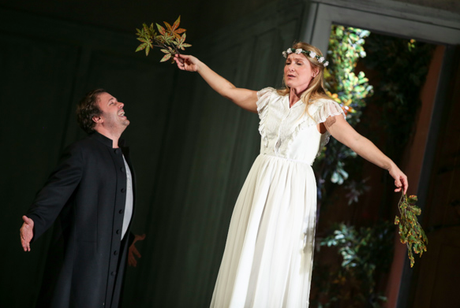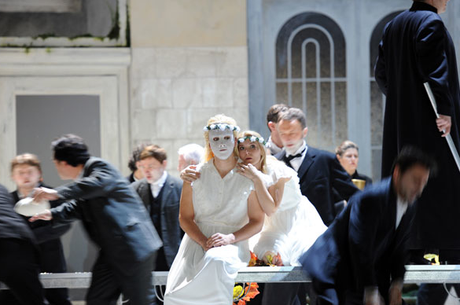
Apollo and Daphne. Photo © Oper Frankfurt/Barbara Aumüller
Last night, I got to see the first performance in this season's revival of Daphne in Frankfurt. The 2010 production by Claus Guth, who also supervised the revival, was of stunning beauty and poignancy, and a strong cast, led by the luminous Maria Bengtsson in the title role, gave moving performances. This was my first live Daphne, and one that helped me understand the opera as a coherent whole. Strauss's exquisite music is bound with an enigmatically layered libretto by Joseph Gregor, and haunted by the circumstances of its creation in 1937-38. Guth's production created an intimate narrative about Daphne's search for truth, and attempts to escape from violence, which managed (I thought) to suggest even the possibility of hope for society as well as the individual in the sublime conclusion. We see Daphne as an old woman (Corinna Schnabel) who visits the home of her youth, now in a state of abandonment and decay, and thus revisits the events of that youth (taking place around the time of the opera's creation.) The rooms of Peneios' and Gaea's household are the backdrop for the unfolding of a powerful drama which is as much allegory as myth, where Daphne attempts in solitude to avoid the violence of male society that Strauss and Gregor so frighteningly evoke. But she can get no closer to utopia than a world of paper birds and cut branches. One of the things which the production accomplishes with remarkable, redemptive success is showing that, while Apollo's and Leukippos' sexual aggression towards Daphne is reprehensible, deserving of the punishment which the god meets out to the youth and to himself, neither Apollo or Leukippos is always-already a rapist: the violence which Daphne so fears is a choice, not a disposition. This was a huge relief for me as audience member, and allows the scenes of emotional intimacy to be seen and heard as genuine, not coercive; Daphne's sense of betrayal by the god is genuine, not a belated realization of falsehood. The drama unfolds gradually, making its way despite all violence, despite all betrayal, to that transcendent finale.
Daphne and Leukippos: seeking refuge in the midst of chaos
Photo © Oper Frankfurt/Barbara Aumüller
Daniel Behle sang the role of Leukippos, Daphne's erstwhile companion and friend, and would-be lover, with great sensitivity. Behle's tenor was exciting and he used phrasing and vocal color expressively. His tragedy also emerges with poignancy, as Daphne forgives him for his failure to see her for who she is, and begs his forgiveness for her similar failure. As Apollo, Peter Marsh won my respect for, first of all, surviving the role with stamina and vocal consistency. Marsh did not merely come through, however; he was compelling. There were a few places where his text could have been clearer, but he brought unexpected and welcome complexity to the figure of this outsider frustrated with the brutality of a narrow society, who in the end has the honesty to condemn himself for being guilty of the same violence. Maria Bengtsson sang Daphne with remarkable beauty and with remarkable range of vocal expressivity. The clarity of her diction and the frankness of her passion were both refreshing; to have a Straussian soprano role with superlative singing and detailed characterization was a luxury, and Bengtsson's phrasing was gorgeous. The progressive revelations of the opera open out further and further, as Daphne comes to fuller understanding of her parents, who have been complicit in violence, of Leukippos, of Apollo, and most importantly, of herself. The final scene I found extraordinarily moving, as the healing and the hope of the aged Daphne is sung in the voice of her youth, as she stands on the moss-grown stones of the courtyard where nature is claiming its supremacy, and claims her community with it.

